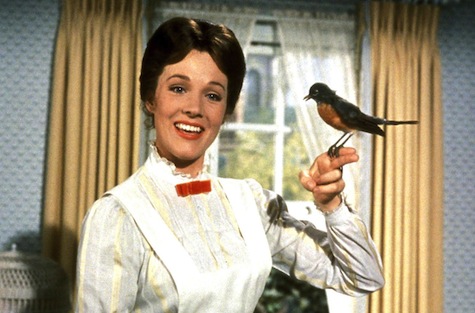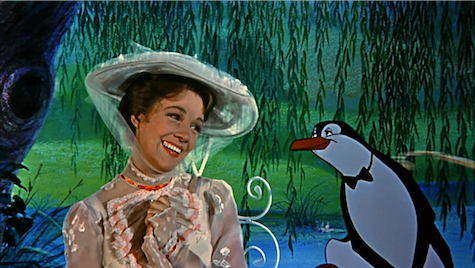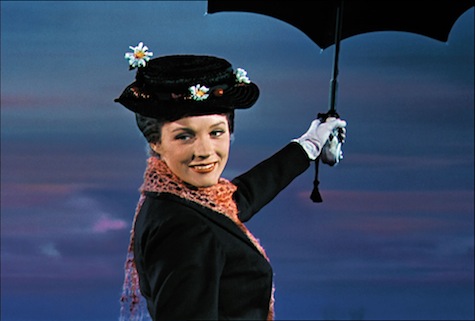Some might say science fiction or fantasy is inaccessible because the settings are unrealistic or the characters exhibit extraordinary or magical abilities. And yet, alternate realities in which people, creatures, and sometimes inanimate objects break into song are totally mainstream. Musicals like West Side Story or The Sound of Music might not qualify as fantasy just for existing in these singing-heavy dimensions, but what about when there’s overt magic involved too?
The film version of Mary Poppins is lousy with magical singing, by which I mean singing that is actually magic-inducing. She’s casting spells in a bizarro dimension using only the power of her perfectly on-key voice. No, really.
Musicals with overt-fantasy elements in them aren’t super uncommon, but they are slightly out-numbered by the more conventional kind. For every Brigadoon and its time-traveling Scottish town, there’s Annie, Les Misérables, and Oliver! No matter how crazy and off the wall shit gets in Oliver!—I mean, hungry orphan children probably can’t do choreographed dance numbers in our universe—there isn’t any actual magic. In the film version of Mary Poppins, our practically perfect nanny posesses a Doctor Who-meets-Harry Potter style of magic. She can pull infinite amounts of objects from her awesome bag, her friends can levitate, and she causes animals to speak and sing. She can fly. But what makes the magic in Mary Poppins so interesting is that the songs themselves all sort of create specific magical events—you could even call them spells.
Now, this isn’t a metaphor. I’m being totally serious. In a ton of fantasy from Tolkien to Rowling to Grossman, you usually have to speak a series of words to make the spell do its thing. In Mary Poppins, these spells are sung. From “Step-In-Time” to “Jolly Holiday,” to “I Love to Laugh,” to the most magical song of all, “Supercalifragilisticexpialidocious,” each song seems to create a certain magical effect. Perhaps the best example is “A Spoonful of Sugar,” which we’re told “makes the medicine go down.” But what really happens when this song is sung? Well, the messes and tasks which normally would take a long time to get done are finished in a more timely fashion thanks to Mary Poppins manipulating time and space, levitating objects, and performing some mild mind control of a little bird. So “A Spoonful of Sugar” is Mary’s ‘clean up the house’ spell. It seems clear that “I Love to Laugh” is Burt and Mary’s ‘uncontrollable levitation spell,’ and “Chim-Chim Cheree” is a spell which allows people (in this case, specifically chimney sweeps) to change the size and shape of their bodies.

And “Supercalifragilisticexpialidocious”? I’m betting that’s a catch-all spell designed to deflect non-magical users from learning more about the secret magical powers someone like Mary Poppins or Burt might possess. True, in the film, “Supercalifragilisticexpialidocious” is this big revelry with fun times being had for all, but there’s a sense that it’s being done for the public; after all, Mary sings this song after winning a race and getting a bunch of (perhaps) unwanted attention. “Supercalifragilisticexpialidocious,” is a spell for hiding your dark, powerful magical abilities by being really fun in the moment. It’s a spell that says “look at me! Look at me! YOU HAVE NO IDEA WHAT YOU’RE LOOKING AT.” Like all good magical creatures, Mary Poppins is a control-freak, and super keen on keeping some of her power a secret.
You might think this songs-as-spells thing in Mary Poppins gets a little tenuous when you consider that a non-magical character like Winifred Banks sings. Or what about “Let’s Go Fly a Kite?” no magic involved there, right? Kites run on science!, you say. Well, Winifred’s non-magical “Sister Suffragette” just proves that the film is living in the conventional alternate reality where most musicals reside anyway. As with most songs in non-magical musicals, Winifred’s singing doesn’t cause events to happen, but rather conveys information. In West Side Story Tony just met a girl named Maria, and tells us so. In Les Misérables, Jean Valjean wants God or whoever to “bring [Marius] home,” but that doesn’t actually make it happen; instead Jean Valjean saves Marius himself. And “Tomorrow” doesn’t grant Annie the ability to speed up or slow down time. She’s just a regular person having a fairly simple and somewhat childish observation on the passage of time.

Mary Poppins, though, would never waste her time singing something that wasn’t a magical spell because she’s not a half-assed philosopher like Annie. Instead, Mary’s a full-on magical being of the highest order and if she lived in the same dimension of Hogwarts or Brakebills, I’m sure she would be drafted instantly to teach all sorts of badass classes. So, today on the 50th Anniversary of one of the best movies of all time, just remember this one thing: if you could sing like Julie Andrews, you could probably make magical things happen around you, too.
Ryan Britt is a longtime contributor to Tor.com.











Been so long I didn’t really consider it like that. Mary and her ilk are spellsingers.
I always figured Mary Poppins was some kind of fae.
Possibly from the same Court as Willy Wonka.
I think Dolores Umbridge grew up fancying herself as Mary Poppins, never realizing she was really Heinrich Himmler.
Alternatively, Mary Poppins espoused order, cleanliness, and obedience but with a sly wink and an nod. Without the wink she’d be Umbridge.
How could you fail to mention the best songs in the whole movie? The Lullaby (I don’t know the official name, but I love it, and used to sing it to my infant son all the time) that obviously sends the kids to sleep. Feed the Birds (probably one of the best Disney songs from anything, ever) which…I don’t know…some kind of subtle mind control to get them to wreak havoc at the bank??
Not to mention the super creepy bank song (which, even as a kid, kind of scared me and actually put me off of the movie for a few years). I am wondering if this is also an example of a spell-song. Is it possible the bankers are dark wizards? DISCUSS.
Also…hmmm…Michael and Jane sing a song about the babysitter they want…and then the letter puts itself back together and Mary Poppins find it. Do the kids have latent powers, or is Mary Poppins just that good and maybe all singing has some kind of latent power.
Although Mr Banks’ song is probably also fairly mundane, as he obviously doesn’t get his precisely ordered life…
She’s a witch! May we burn her?
Anyone who thinks it takes an alternate reality to have characters abruptly break out into song (even original song) clearly hasn’t spent much time around my family. Unfortunately, magic powers have not yet manifested themselves.
@3
This is the best sentece I’ve read this week. And quite true.
Wow. I never would have thought Marry Poppins to be so vile and cunning. Shows me what I know. Its amazing those children weren’t enslaved by any of her songs.
“….performing some mild mind control of a little bird.”
*Mild* mind control? She summoned that robin all the way from North America! I wonder why she couldn’t make do with a European robin?
http://en.wikipedia.org/wiki/European_robin
I have always thought that Mary Poppins was a witch in the HP universe. Her job is to go to the houses of young muggleborns and help them to control their unexpected, untrained magic. My husband, on the other hand, maintains that she must be a timelord/timelady because of the carpetbag that is bigger on the inside, and possibly for her taste in scarves and hats.
In the books, her transcendent magical nature isn’t reliant on singing of course–perhaps it’s just that the transition to the musical universe automatically translates other magical abilities into spellsinging?
@@@@@ 3
This is perfect, thank you.
Years ago, my daughter and I decided that Mary Poppins was once a student at Hogwarts, in the Hufflepuff House.